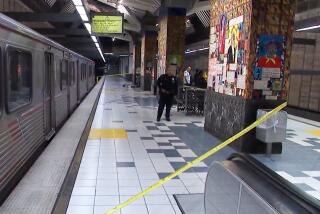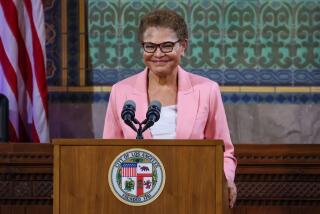Experts see value in data on Muslims
As Los Angeles police shelved a plan to map Muslim enclaves in the city, law enforcement officials and terrorism experts on Thursday questioned whether the department’s mishandling of the project had cost it a potentially useful tool in identifying extremists.
“Certainly they have clipped off an opportunity to get closer to their potential targets,” said Ken Piernick, a retired senior counter-terrorism official with the FBI. “In this area, every little thing you do has the potential to be of assistance.”
Brian Levin, a former New York Police Department officer who directs the Center for the Study of Hate and Extremism at Cal State San Bernardino, agreed.
“In the abstract,” Levin said, “the data could have had some value.”
But they and other experts cautioned that the ultimate value of the information in identifying Islamic extremists would have hinged on how the data were collected and on the collaboration among Arabs and Muslims in developing the project. And that, the experts said, was where the department’s project unraveled.
Having endured six years of suspicion and controversial prosecutions around the U.S., America’s Arab and Muslim communities are understandably sensitive to any new police initiative that might smack of racial or religious profiling, experts said.
“Data collection doesn’t occur in a vacuum, and here it has come after a period of intense intimidation of Arabs and Muslim communities nationally,” Levin said. “Intent is everything and perception is everything. And in this particular case, those factors clashed and obliterated any chance of a positive outcome.”
Historically, Piernick and others noted, law enforcement has often used neighborhood demographics as a factor in ferreting out lawlessness.
“In the old days, when you looked for La Cosa Nostra, you didn’t start looking in Polish neighborhoods,” he said.
But Piernick said that the public descriptions of the Los Angeles Police Department’s mapping plan, whether accurate or not, made it appear too broad.
“It was like using a shotgun for a sniper shot,” Piernick said. “In the public arena, it sounded as if they wanted to simply map out Muslim neighborhoods. For what? So they could build large walls around them?”
In a news conference after his two-hour meeting with Muslim American community leaders Thursday, Los Angeles Police Chief William J. Bratton declared the mapping plan was “DOA -- dead on arrival.” He said he would be sending a letter to community leaders, mosques and Islamic social service agencies saying that no community policing proposal would go forward without their participation and support.
Instead, the LAPD would launch what he called a Chief’s Forum so the Muslim community and the Police Department could begin developing initiatives jointly to help each get to know the other better, according to Deputy Chief Michael P. Downing, one of the mapping plan’s original architects.
One possible initiative, Downing said, would be to send 40 Muslim leaders through the 10-week program at the community police academy so they could more fully understand the Los Angeles police organization.
Bratton reiterated that the mapping plan was never meant to be racial profiling.
“What we seek to do is know our community,” Bratton said. “My intention was to understand: Who is the leadership? What are the places of worship? Where are the schools? It’s unfortunate that the effort from its inception was not understood.”
Los Angeles Mayor Antonio Villaraigosa told Bratton last week of his concern about the LAPD plan, according to Matt Szabo, the mayor’s spokesman.
This week, Szabo said, Deputy Mayor Arif Alikhan told Bratton and Downing that the mapping proposal was “causing fear and apprehension in the Muslim community and was counterproductive.”
Alikhan, a Muslim and deputy mayor for homeland security and public safety, spoke on behalf of Villaraigosa, Szabo said. He declined to say whether Villaraigosa demanded that the LAPD scrap the plan but said, “The mayor’s feelings on the proposal were made crystal-clear by Arif.”
The diverse group of Muslim leaders who met with Bratton uniformly praised the LAPD for its quick response in dropping the controversial plan. They included both Shiite and Sunni Muslims and leaders of African, Iranian, Egyptian, Iraqi and Pakistani descent, among other ethnicities.
“It’s a great relief to know we’ll be treated like all citizens,” said Hussam Ayloush, executive director of the Council on American-Islamic Relations Greater Los Angeles office in Anaheim. “There are no second-class citizens in Los Angeles today.”
Salam Al-Marayati, executive director of the Muslim Public Affairs Council, called the police action a “great step for democracy.”
“We saw today democracy in action,” he said. “The chief told us that nothing moves forward without the input, participation and support of the Muslim community.”
Several representatives from other religious and civil rights organizations turned out to support the Muslims.
They included representatives from the Roman Catholic Archdiocese of Los Angeles, the Episcopal Diocese of Los Angeles, progressive Jewish and Christian organizations and Japanese American civil rights groups.
Jews and Japanese Americans in particular said they did not want to see anyone targeted the way their communities were singled out before and during World War II.
teresa.watanabe@latimes.com
More to Read
Start your day right
Sign up for Essential California for news, features and recommendations from the L.A. Times and beyond in your inbox six days a week.
You may occasionally receive promotional content from the Los Angeles Times.







